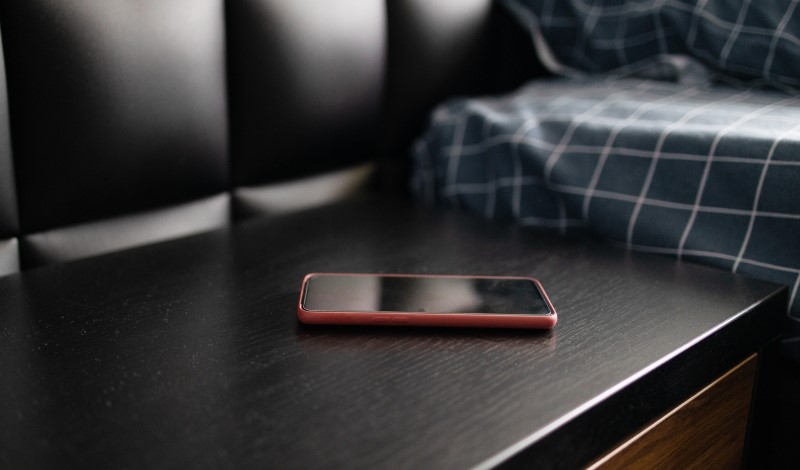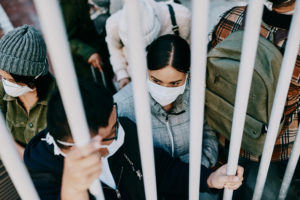
FCC says a cell phone can be an abuser’s tool of control or a survivor’s lifeline.
Almost 12 million Americans—nearly one in three women and one in four men—are affected by domestic violence every year, according to the National Domestic Violence Hotline. To protect survivors, the Federal Communications Commission (FCC) recently adopted a rule to provide survivors with secure and affordable access to cell phones.
Cell phones can be tools of control wielded by abusers to monitor a survivor’s calls, texts, and location, experts say. Many survivors find themselves financially dependent on their abusers or unable to connect to hotlines or job opportunities without fear of discovery. But cellphones can also offer survivors a lifeline by providing confidential access to family members or support centers.
In a 5-0 vote, the FCC adopted a regulation aimed at protecting domestic violence survivors’ access to cell phones and giving them tools to escape dangerous living environments. The new rule focuses on family billing plans, which let authorized users view phone call logs and limit data use. The rule also requires phone companies to hide all calls made to designated domestic violence hotlines and to separate survivors’ lines from the rest of a family billing plan upon request.
The FCC adopted the rule after Congress passed the Safe Communications Act of 2022, which authorized the Commission to address the communication needs of survivors, including confidential access to support resources and phones free from abusers’ surveillance. The legislation recognizes that not all abuse is physical: abusers can use cell phones as tools to deny survivors financial independence.
Speaking in support of the new rule, Denise Golumbaski, Attorney Advisor at the FCC’s Wireline Competition Bureau, said that multi-line family plans present “unique challenges” for survivors.
For example, some survivors do not have phones and must borrow one to call a hotline. Others may list hotline numbers as “Pizza” or “Chinese food” to avoid suspicion, according to Isabel Sierra, an advocate at a domestic violence shelter in Kansas City, Missouri.
The FCC’s new rule addresses the risks of family plans in several ways. It calls for the establishment of a domestic abuse hotline database and requires all service providers to “completely exclude” any records of calls or text messages to covered hotlines from consumer-facing call logs. Service providers must also retain those records within their system for potential criminal or civil investigations.
FCC Chairwoman Jessica Rosenworcel emphasized that the rule’s privacy protections are critical for survivors to “reach out without fear of discovery from abusers.”
Survivors will also have the right to separate their line from a family plan by submitting a request to their service provider. The new rule requires that survivors attach to their request either a signed affidavit from a licensed professional or a copy of an official document containing the name of the abuser and survivor and an allegation of an act of abuse.
At support hotlines, employees are trained to answer carefully and to not identify themselves with a support center at first, as abusers sometimes investigate numbers that survivors frequently call. Because the FCC’s rule will place service provider employees in similar positions, providers are required to train certain employees to assist survivors with line separation.
The rule prohibits service providers from conditioning line separation on any fees, increase in charges, or approval by the primary account holder, and it allows survivors to separate the lines of individuals in their care, too.
The FCC acknowledged that even with separated lines, spyware applications or software on devices may still endanger survivors. But the agency concluded that regulating apps and software would exceed the scope of the Safe Communications Act.
The FCC’s rule also expands the Commission’s Lifeline program, a discount program available to all low-income consumers that provides emergency support to survivors. Survivors will be eligible for discounts on voice-only and broadband services. Although the Safe Communications Act limits survivor participation to six months, eligible survivors still facing financial hardship may participate in other Lifeline programs.
In her statements before voting on the bill, Commissioner Anna Gomez emphasized the particular challenges that Native American women face, citing a 2016 National Institute of Justice study that found that 84 percent of American Indian and Alaska Native women have experienced domestic violence in their lifetime.
Commissioner Gomez called on tribal governments and police to step up and help survivors, noting that they can play an important role by attesting to their status as a survivor when requesting line separation. The Lifeline program for survivors also extends enhanced benefits to survivors on Tribal land.
The FCC’s rule aligns with the Biden Administration’s other domestic violence initiatives, such as expanding Tribal criminal jurisdiction, improving LGBTQ+ survivor resources, and closing gun possession loopholes for domestic abusers. And while legal and practical problems stall funding and statutory initiatives, the FCC’s rule, which will take effect in the coming months, will provide immediate and tangible privacy protections to survivors.



